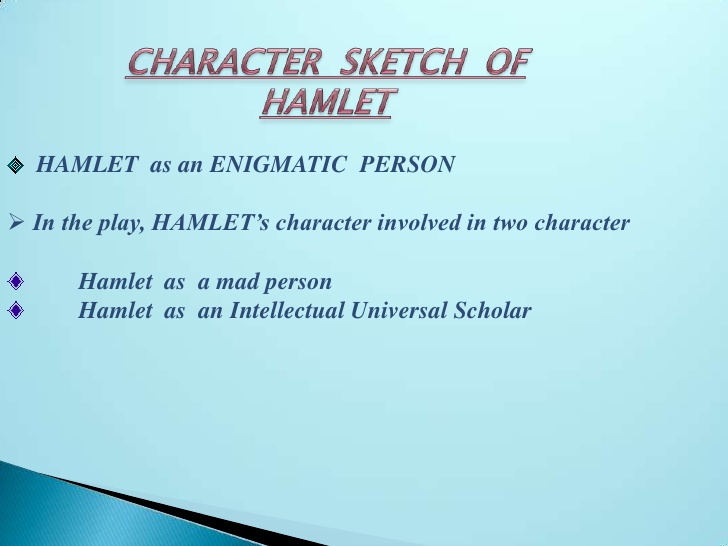HAMLET Nature and Intellectual Depth
Philosophical nature and intellectual depth are recognized as most power full quality in SHAKESPEARE Hamlet This quality is clearly seen in all his soliloquies. His soliloquies show him to be a man of deeply reflective and meditative nature. In his very first soliloquy, we find him meditating upon the indecent haste with which his widowed mother has re-married. He deplores the fact that his mother is married to his uncle who is in every respect inferior to his dead father. This gross behavior of his mother makes Hamlet generalize: “Frailty, thy name is woman”. In his next soliloquy, Hamlet meditates upon the revelation that the Ghost has made.

He now regards his mother as a extremely disloyal woman”, and he regards his uncle as a “villain, smiling, damned villain”. The deceptive looks of his uncle make him generalize thus: “That one may smile, and smile, and be a villain“. In another soliloquy, Hamlet broods upon his delay in carrying out the task imposed upon him by the Ghost, and castigates himself in very strong words, calling himself an “ass” and a “scullion”. In this same soliloquy, he devises a plan by which he can understand “evil conscience of the King. In another soliloquy,. Hamlet meditates upon the consequences of his murdering Claudius, when Claudius is at his prayers. If killed at prayer, Claudius would go straight to heaven, he thinks. These soliloquies not only reveal that Hamlet is given to excessive speculation and that he is therefore unfit for carrying out the task imposed upon him, but also enable us to understand Hamlet’s reasons ‘for delaying his revenge. Each of these soliloquies is a masterpiece not only as regards its philosophic content but also as regards its style and linguistic excellence. In brief, these soliloquies show Hamlet as a scholar, a philosopher, and a poet.
His Use of the Pun and Other Forms of Word-Play
Hamlet’s language puts much stress on the pun and other forms of word play. This habit of speech, so often a lapse in taste, is here appropriate to the portrayal of a keen mind tortured by alternatives. In his first appearance, Hamlet expresses complex meaning in each of his answers to the King and the Queen. In each double meaning, Hamlet shows anger to the heart of seeming. Small wonder that he exults in the grave-digger’s playing upon the idiotic and profound question of the ownership of a grave: this one belongs to one who is not a woman, but who wax a woman.
His Introspective Nature
Introspective as he is, Hamlet is constantly analyzing himself inwardly. He is forever looking into himself, trying to find out into his own nature to seek truth for this or for that, and giving vent to his deepest thoughts in soliloquies. In one respect, however, he keeps us in the dark about his real thinking. In none of his soliloquies does he throw any light on his true attitude towards Ophelia. The result is that, so far as his relations with Ophelia are concerned, we face an ambiguous situation. However, there is adequate external evidence to support the view that he actually loved Ophelia at one time. He wrote love letters to her and gave her presents as a token of his love. If subsequently he becomes harsh, callous and even obscene in his talk with her, it is because he wrongly begins to believe that Ophelia has betrayed him and that she is guilty of treachery towards him. While it is true that Ophelia has allowed herself to be used as a tool by her father, it is wrong to believe that she has ceased to love him or that she is no longer true to him.
The fact that she becomes an instrument in the hands of her father in spying upon Hamlet merely serves further to confirm her simplicity of nature and her inexperience of life. That Hamlet, who is a man of great intellectual powers, should be guilty of an error in judging the character of Ophelia certainly goes against him, especially when we know that, in his assessment of other characters, he shows a penetrating insight The passage in which he analyses the character of Horatio is only one illustration of this insight into human character. His quick understanding of the reasons which have brought Roscncrantz and Guil- denstern to him and his ability to see through their hypocrisy also show that, on the whole, his judgment of human character is highly commendable.
The Philosophy Of Shakespeare Hamlet and Facts Everyone Should Know
His Weapons: Wit, Irony, Sarcasm
Hamlet possesses a rare wit, although his wit is bitter, cynical, and mordant. He wields the weapons of irony and sarcasm with deadly effect. His retorts Jo the King, the Queen, Polonius, Rosencrantz and Guildenstern are devastating, it is wrong, on the basis of such retorts, to conclude that Hamlet is mad. Several of these retorts arc certainly obscure in meaning, but each one of them is deliberate, and the ready wit which prompts them is noteworthy. His wit certainly becomes merciless and cruel when he attacks the innocent Ophelia whom he insults with his obscenities. If his wit is worthy of a genius, his obscenities certainly lower him somewhat in our estimation, especially because they are directed against a person whom he has grievously misjudged.
Not a Man of Action
It is clear that Shakespeare Hamlet is a philosopher and not a man of action. But it has to be noted that, although Hamlet is not capable of planned and premeditated action ’as seen in his indefinitely postponing his revenge, he is not incapable of impulsive action. There are many things that we, knowing him to be a meditative and philosophical type of man, did not expect him to do but which he docs, in these cases, he acts purely on impulse. He kills Polonius. He boards the pirate ship alone. He leaps into Ophelia’s grave after Laertes has done so. Finally, he stabs Claudius. None of these actions, be it noted, is premeditated. And, what is more, Hamlet is completely disregarding full of the consequences of such impulsive actions.
Self-Revelation in His Soliloquies
Hamlet’s soliloquies stand out as essential pillars of the dramatic structure. In these speeches Hamlet, with relentless sincerity settles accounts with himself in thoughts that spring from the very depths of his being. “Q, that this, too, too solid flesh would melt.” Appalled at the frailty and inconstancy of women, as represented by his mother, the world-weary Hamlet wishes that suicide were not contrary to Church law, and gives himself over to a passionate condemnation of his mother’s immodesty in her hasty marriage with Claudius.
“O, what a rogue and peasant slave am I” In this soliloquy, Hamlet shows himself, as on many other occasions, conscious of his own inactivity in the avenging of his father’s death.. For, having seen the emotion which the player pours forth about the death of Priam, a mere figure from the Greek legend of many centuries past, he cannot but ask himself what emotion the player would have expressed had he, like him, lost a father at the hands of a cruel and cunning murderer. Thus Hamlet’s conscience stirs his body to action—to revenge. Yet once again he wavers, in spite of his passionate outbursts of self-condemnation.
A Man of Great Talents
SHAKESPEARE Hamlet appears to us a man of great talents, almost geniuses, whose rich imagination, extreme sensitiveness, imitative gifts, and aesthetic interests are those of an artist, but are combined with a great thirst for knowledge and a predilection for the establishment of general truths. furthermore, a love of all that is genuine, an inner eye for what is sham or exaggerated, and a deep hatred of hypocrisy; his subtlety in argument borders on sophistry, he delights in the use of ironic wit and sarcasm, ands in spite of much critical sense, is intolerant and possessed of a certain mental arrogance. He likes diplomacy and silence to frankness. It also makes him continually compare himself disadvantageous^ with others who have something to their credit. Yet he is high-minded and has a hatred of fawning; he is immediately attracted by all that is noble and great, but he can be merciless when his feeling* are wounded as is seen in his relationship with his mother and in a lesser degree with Polonius, Roscn- crantz and Guilden.stcrn.
His tendency to introspection, which lie shares with so many Shakespearean characters, is intensified by melancholy into a positive craving for self-dissection ; but his personality is so quickly clouded by temporary nervous excitement or irritability that it would be dangerous in every case to try to seprate his character from his mood. At all events his hypersensitiveness is such that he is incapable of pulling himself together and breaking free from his obsessions. It is these obsessions that are fundamentally the cause of his decision to feign madness which is decisive for the whole action of the play.”
Creating a tabular guide for “Facts About Shakespeare’s ‘Hamlet’ Analysis” involves organizing key information about the play in a structured format. Here’s how it can be laid out:
| Aspect | Details |
|---|---|
| Title | Hamlet |
| Author | William Shakespeare |
| Genre | Tragedy |
| Written In | Around 1600 |
| Setting | Denmark |
| Key Themes | Revenge, Tragedy, Madness, Betrayal, Corruption, Appearance vs. Reality |
| Plot Overview | The play tells the story of Prince Hamlet who seeks revenge on his uncle Claudius for murdering his father, marrying his mother, and seizing the throne. |
| Major Characters | Hamlet, Claudius, Gertrude, Polonius, Ophelia, Laertes, Horatio |
| Famous Lines | “To be, or not to be, that is the question,” “Alas, poor Yorick! I knew him, Horatio.” |
| Symbolism | The ghost (reflects inner guilt), Yorick’s skull (mortality), The play within a play (appearance vs. reality) |
| Literary Devices | Soliloquies, Irony, Dramatic Foils, Symbolism, Word Play |
| Critical Analysis | Hamlet is often analyzed for its exploration of themes like indecision, revenge, and madness. Critics also discuss Shakespeare’s use of language and the complexity of the characters, especially Hamlet himself. |
This table offers a concise yet comprehensive guide to the key aspects of Shakespeare’s “Hamlet,” suitable for study or reference.
Conclusion
Shakespeare’s Hamlet is a masterpiece that unfolds a plethora of insights and emotions for readers and theatergoers alike. Its timeless themes, complex characters, and profound language make it a work of art that transcends time and place. By diving into the world of Hamlet analysis, readers can gain a deeper understanding and appreciation for this iconic play, discovering new layers of meaning with each exploration.
